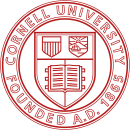
Back Cornell-universiteit Afrikaans جامعة كورنيل Arabic جامعة كورنيل ARZ Universidá Cornell AST Kornell Universiteti Azerbaijani کورنل بیلیمیوردو AZB Карнельскі ўніверсітэт Byelorussian Университет „Корнел“ Bulgarian কর্নেল বিশ্ববিদ্যালয় Bengali/Bangla Universitat Cornell Catalan
 | |
| Latin: Universitas Cornelliana[1] | |
| Motto | "I would found an institution where any person can find instruction in any study"[2][3] |
|---|---|
| Type | Private[4] land-grant research university |
| Established | April 27, 1865 |
| Founder | |
| Accreditation | MSCHE |
Academic affiliations | |
| Endowment | $10.7 billion (2024)[5] |
| Budget | $5.4 billion (2023)[6] |
| President | Michael Kotlikoff (interim) |
| Provost | John Siliciano |
Academic staff | 1,639 in Ithaca, New York 1,235 in New York City 34 in Doha, Qatar |
| Students | 26,284 (fall 2023)[7] |
| Undergraduates | 16,071 (fall 2023)[7] |
| Postgraduates | 10,207 (fall 2023)[7] |
| Location | , New York , United States 42°26′57″N 76°29′2″W / 42.44917°N 76.48389°W |
| Campus | Small city[8], 745 acres (301 ha)[citation needed] |
| Other campuses[9] |
|
| Newspaper | |
| Colors | Carnelian red and white[10] |
| Nickname | Big Red |
Sporting affiliations | |
| Mascot | Touchdown the Bear (unofficial)[11] |
| Website | cornell |
Cornell University is a private Ivy League land-grant research university based in Ithaca, New York, United States. The university was founded in 1865 by Ezra Cornell and Andrew Dickson White. Since its founding, Cornell has been a co-educational and nonsectarian institution. As of fall 2023, the student body included 16,071 undergraduate and 10,207 graduate students from all 50 U.S. states and 130 countries.[7]
The university is organized into eight undergraduate colleges and seven graduate divisions on its main Ithaca campus.[12] Each college and academic division has near autonomy in defining its respective admission standards and academic curriculum. In addition to its primary campus in Ithaca, the university administers three satellite campuses, including two in New York City, the medical school and Cornell Tech, and a branch of the medical school in Al Rayyan, Qatar's Education City.[12]
Cornell is one of three private land-grant universities in the United States.[a] Among the university's eight undergraduate colleges, four are state-supported statutory or contract colleges through the State University of New York system, including the College of Agriculture and Life Sciences, the College of Human Ecology, the Industrial and Labor Relations School, and the Jeb E. Brooks School of Public Policy. Among Cornell's graduate schools, only the Veterinary Medicine College is supported by New York. The main campus of Cornell University in Ithaca spans 745 acres (301 ha).
As of October 2024,[update] 64 Nobel laureates, 4 Turing Award winners, and 1 Fields Medalist have been affiliated with Cornell. Cornell counts more than 250,000 living alumni, which include 34 Marshall Scholars,[13] 33 Rhodes Scholars, 29 Truman Scholars, 63 Olympic Medalists, 10 current Fortune 500 CEOs, and 35 billionaires.[14][15][16][17][18]
- ^ The Celebration of the Two Hundred and Fiftieth Anniversary of the Royal Society of London, July 15-19, 1912. Royal Society. 1913. p. 74.
- ^ Altschuler, Glenn C.; Kramnick, Isaac (2014). Cornell: a history, 1940-2015. Ithaca: Cornell University Press. p. 355. ISBN 9780801471889.
- ^ Berg, Alex (21 August 2007). "C.U. Motto Earns Top Rank". The Cornell Daily Sun. Retrieved 21 March 2024.
- ^ "Cornell University Mission". Cornell University. Retrieved 26 October 2013.
- ^ Cite error: The named reference
endowmentwas invoked but never defined (see the help page). - ^ "Consolidated Financial Statements: June 30, 2023 and 2022" (PDF). cornell.edu (Press release). Cornell University.
- ^ a b c d "Student Enrollment". University Factbook. Cornell University. 1 November 2023. Retrieved 1 November 2023.
- ^ "Cornell University". IPEDS. Retrieved 6 March 2022.
- ^ "Cornell University". Middle States Commission on Higher Education.
- ^ "Colors". Cornell University Brand Center. Retrieved 17 July 2019.
- ^ Cite error: The named reference
mascotwas invoked but never defined (see the help page). - ^ a b "Colleges and Schools". cornell.edu. Cornell University. Retrieved 29 May 2024.
- ^ "Statistics". marshallscholarship.org. Marshall Scholarship. Retrieved 2 November 2020.
- ^ "Wealth-X Applied Wealth Intelligence" (PDF).
- ^ Hess, Abigail (29 November 2018). "University of Wisconsin produced the most current Fortune 500 CEOs — here's how 29 other schools stack up". CNBC. Retrieved 16 June 2020.
- ^ "Factbook" (PDF). Cornell University. October 2009. Archived from the original (PDF) on 26 June 2006. Retrieved 27 December 2009.
- ^ "Nobel laureates affiliated with Cornell University". Cornell Chronicle (Press release). Cornell News Service. Retrieved 12 September 2022.
- ^ "Uncle Ezra". Cornell University. Archived from the original on 2 January 2007. Retrieved 10 January 2007.
Cite error: There are <ref group=lower-alpha> tags or {{efn}} templates on this page, but the references will not show without a {{reflist|group=lower-alpha}} template or {{notelist}} template (see the help page).